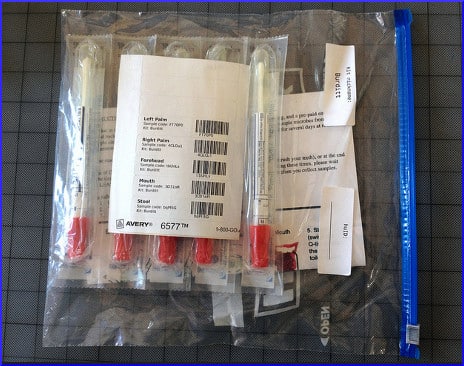
Aside from the potentially worrying fact that it was partially funded by two gigantic food manufacturers, there is more to know about the Washington University School of Medicine study on which Dr. Jeffrey Gordon worked with Vanessa Ridaura and other graduate students. They started with germ-free lab mice, and gut bacteria harvested from human twins. These were special twin pairs who had started life identical, but grew up to differ in their physical sizes.
All the mice got the same amount of the same food, and lolled around in their cages doing not much. But some of them—the recipients of microbes from the obese twin, who were called Ob mice—got fat. The other group, whose intestinal fauna had been donated by the lean twin, remained normal weight and were called Ln mice.
The Role of Food in the Microbiome
Next, Lns and Obs were caged together, to take advantage of their habit of coprophagia (eating feces), which is an efficient way to share microorganisms. This was where something really interesting showed up. Ob mice were able to catch fat resistance from the Ln mice by ingesting some of their microbes.
The remarkable thing is that it doesn’t work the other way. Even when they take the strange bugs on board, Ln mice don’t catch fat-proneness. They can repel or disarm microscopic invaders whose basic philosophy of life disagrees with their own. The ScienceDaily.com piece summarizes the dilemma:
“So, why isn’t there an epidemic of leanness in America?” Gordon asked rhetorically, considering the stability of the lean microbiota.
Food was the obvious place to look. The team painstakingly formulated and cooked up two varieties of rat chow: high fiber/low saturated fats, and high saturated fats/low fiber. The latter represents the typical American diet, and guess what? When the Ln mice ate that stuff, their microbiomes lost the extraordinary ability to resist fat-promoting colonizers. Their bodies could no longer sustain the fight.
The unmistakeable takeaway is, “Eat more fiber and avoid saturated fats.” That’s fruits and vegetables, and psyllium husks. But the supremacy of fiber is not the only message. The study authors say:
These findings suggest that more complex interactions between diet, body mass and gut microbiota underlie human metabolic disturbances than researchers have appreciated.
There is a relatively benign reason why food corporations might sponsor this kind of research. Food-based therapies can be personalized like never before. There is a market for intensely customized probiotics. The appeal of genealogical research might fade, stacked up against the ability to find out who lives inside us right now, and how best to get along with them.
Is it possible that food companies might have darker motives than mere product development? Would it benefit them to prove that their empty, addictive pseudo-food abominations are actually not to blame for the obesity epidemic? The question ultimately comes down to, can research be bought? All we can do is hope not.
Your responses and feedback are welcome!
Source: “Human gut microbes alter mouse metabolism, depending on diet
ScienceDaily.com, 09/05/13
Image by Juhan Sonin

 FAQs and Media Requests:
FAQs and Media Requests: 











